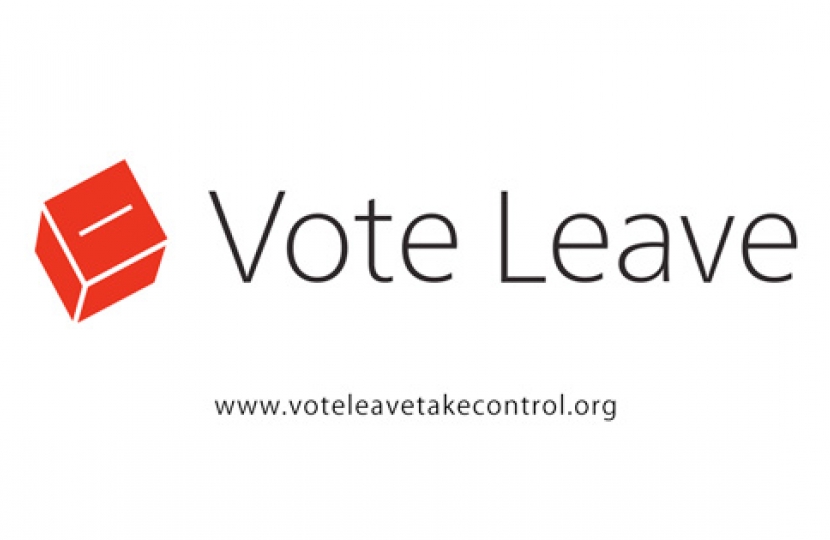
The EU referendum on 23rd June 2016 is the most important vote that we will have on Britain’s place in the world. This is a once-in-a-lifetime chance for those of my generation, so I have spent a lot of time listening, reading and discussing the issues involved. As an MP I have also had the opportunity to scrutinise the terms of the deal secured by the Prime Minister, listen in Parliament to his cogent defence of its terms, and have also spoken to him personally about my views.
There are strong arguments on both sides of the debate, but on balance, leaving the EU serves our national interests better. I have huge respect for David Cameron, and believe that he has secured the best that he could have done in the circumstances. We sent our best batsman to the crease and he played a blinder with the balls that were bowled. This was our best chance to get real and lasting reform. But characteristically of the EU’s intransigence and inflexibility, it was unable or unwilling to offer him the fundamental changes that Britain needs to justify our continued membership. For that reason, I will be voting to leave the EU.
This was not an easy decision for me to reach because I do see the advantages of staying in the EU. Membership of a political union at this uncertain time is reassuring, and access to the single market brings considerable economic benefits. I have personally benefitted from free movement of workers, having lived in France for two years, as an ERASMUS student and then as an Entente Cordiale Scholar at the Sorbonne. Whilst there, I studied for a Masters in European Law, spending time on secondment at a Parisian law firm specialising in EU Competition Law. I speak both French and Spanish, and have a deep appreciation of our cultural and historic links with our European partners.
So I am neither ignorant of the practical realities of our EU membership, nor unsympathetic to the cause of European friendship and co-operation. But like many people, I have long been sceptical about the direction in which the EU has taken us. My concerns centre on three main areas, which I will outline briefly.
First is the issue of sovereignty and legal primacy. As a Barrister who is now a Legislator, I am uncomfortable with the fact that our legal system and laws are increasingly overridden by the EU. Decisions of the European Court of Justice have gradually established the principle that EU law has supremacy over our laws. Having specialised in immigration law, I have seen the effect of EU supremacy, rendering our systems for managing immigration less effective than necessary. EU supremacy has a real impact on our lives: the UK parliament was recently unable to reduce VAT on women’s sanitary products without agreement from Brussels; insurance companies in the UK cannot charge male drivers more than female drivers for insurance, despite the former being a greater risk on the roads, because of EU law. This seriously damages the democratic credibility of our own institutions.
Secondly, on political accountability, much of the frustration people feel with the EU stems from a lack of accountability of its institutions. The right to initiate legislation lies with the unelected and remote Commission, whilst the elected element- the European Parliament – suffers from a lack of legitimacy and relatively weak powers. In the European Council of heads of government, the UK is one voice amongst 28, and is consistently outvoted. All of this means voters in the UK have little or no direct control over those making decisions which affect their lives, and no way of removing them. For a union of democratic nation states, this is a real concern.
Lastly, there is the issue of business and economic opportunity. Whilst the single market has many benefits, I do not accept that these require us to remain a member of the EU at any cost. We are the fifth largest economy in the world, and a valuable global trading partner, putting us in a powerful position to negotiate fresh trade deals with other countries in Europe and, crucially, beyond. At present, we are limited by the cumbersome deals agreed by the EU, which restrict our ability to pursue valuable new opportunities in emerging markets. Greater freedom to work bilaterally around the world would provide us with more potential benefits than we have now. Our businesses too would be liberated from costly red tape and regulation.
For these reasons, I am sceptical of the political project being pursued under the auspices of the European Union. I had hoped to see some progress towards reforming those elements which I consider to be against the interests of the UK, and I welcome many of the concessions the Prime Minister has been able to secure. But it has become increasingly clear that the scale of change that is required is not possible through an incremental negotiation of the sort we have seen. As it is not possible for us to achieve fundamental reform from within the EU, I can only conclude that the right thing to do is to leave.
